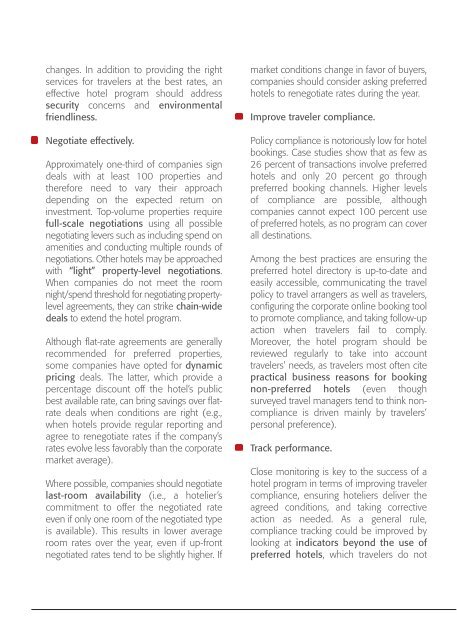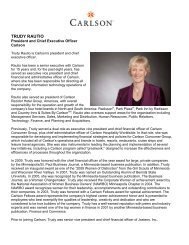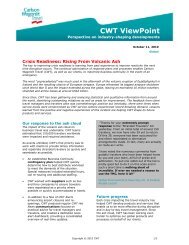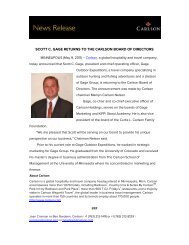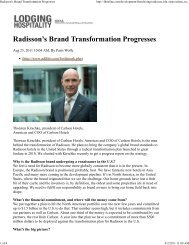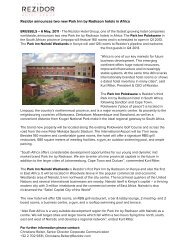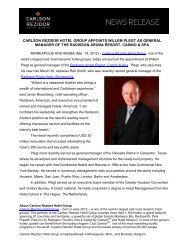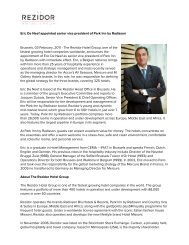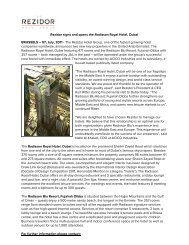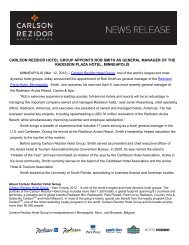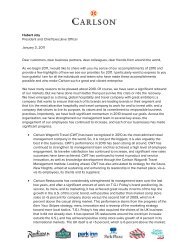Room for Savings: Optimizing Hotel Spend - Carlson
Room for Savings: Optimizing Hotel Spend - Carlson
Room for Savings: Optimizing Hotel Spend - Carlson
You also want an ePaper? Increase the reach of your titles
YUMPU automatically turns print PDFs into web optimized ePapers that Google loves.
changes. In addition to providing the right<br />
services <strong>for</strong> travelers at the best rates, an<br />
effective hotel program should address<br />
security concerns and environmental<br />
friendliness.<br />
Negotiate effectively.<br />
Approximately one-third of companies sign<br />
deals with at least 100 properties and<br />
there<strong>for</strong>e need to vary their approach<br />
depending on the expected return on<br />
investment. Top-volume properties require<br />
full-scale negotiations using all possible<br />
negotiating levers such as including spend on<br />
amenities and conducting multiple rounds of<br />
negotiations. Other hotels may be approached<br />
with “light” property-level negotiations.<br />
When companies do not meet the room<br />
night/spend threshold <strong>for</strong> negotiating propertylevel<br />
agreements, they can strike chain-wide<br />
deals to extend the hotel program.<br />
Although flat-rate agreements are generally<br />
recommended <strong>for</strong> preferred properties,<br />
some companies have opted <strong>for</strong> dynamic<br />
pricing deals. The latter, which provide a<br />
percentage discount off the hotel’s public<br />
best available rate, can bring savings over flatrate<br />
deals when conditions are right (e.g.,<br />
when hotels provide regular reporting and<br />
agree to renegotiate rates if the company’s<br />
rates evolve less favorably than the corporate<br />
market average).<br />
Where possible, companies should negotiate<br />
last-room availability (i.e., a hotelier’s<br />
commitment to offer the negotiated rate<br />
even if only one room of the negotiated type<br />
is available). This results in lower average<br />
room rates over the year, even if up-front<br />
negotiated rates tend to be slightly higher. If<br />
market conditions change in favor of buyers,<br />
companies should consider asking preferred<br />
hotels to renegotiate rates during the year.<br />
Improve traveler compliance.<br />
Policy compliance is notoriously low <strong>for</strong> hotel<br />
bookings. Case studies show that as few as<br />
26 percent of transactions involve preferred<br />
hotels and only 20 percent go through<br />
preferred booking channels. Higher levels<br />
of compliance are possible, although<br />
companies cannot expect 100 percent use<br />
of preferred hotels, as no program can cover<br />
all destinations.<br />
Among the best practices are ensuring the<br />
preferred hotel directory is up-to-date and<br />
easily accessible, communicating the travel<br />
policy to travel arrangers as well as travelers,<br />
configuring the corporate online booking tool<br />
to promote compliance, and taking follow-up<br />
action when travelers fail to comply.<br />
Moreover, the hotel program should be<br />
reviewed regularly to take into account<br />
travelers’ needs, as travelers most often cite<br />
practical business reasons <strong>for</strong> booking<br />
non-preferred hotels (even though<br />
surveyed travel managers tend to think noncompliance<br />
is driven mainly by travelers’<br />
personal preference).<br />
Track per<strong>for</strong>mance.<br />
Close monitoring is key to the success of a<br />
hotel program in terms of improving traveler<br />
compliance, ensuring hoteliers deliver the<br />
agreed conditions, and taking corrective<br />
action as needed. As a general rule,<br />
compliance tracking could be improved by<br />
looking at indicators beyond the use of<br />
preferred hotels, which travelers do not


